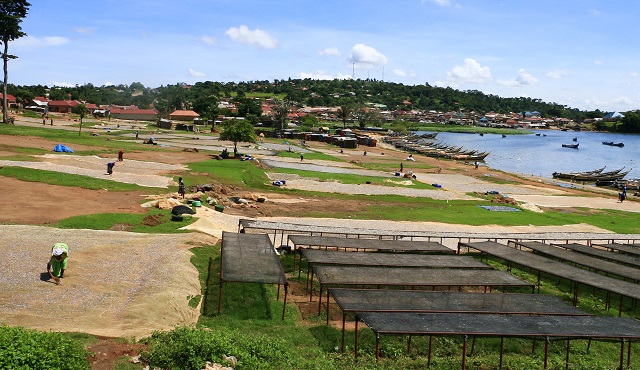
American-sponsored projects targets Lake Victoria’s fisherfolk
Kampala, Uganda | RONALD MUSOKE | A new HIV/AIDS prevention programme targeting Lake Victoria fisher folk in Mukono and Buikwe districts will be launched this month.
Known as STAR-C (Strengthening the HIV/AIDS Response in Central Uganda), the project will be run by Kampala-based Naguru Teenage Information and Health Centre, a local non-profit that has over the last 30 years been working to deliver youth-friendly sexual and reproductive health services.
Gilead Sciences, Inc., an American biopharmaceutical company whose focus is on researching and developing antiviral drugs used in the treatment of HIV/AIDS and other viral infections, is funding it.
The project intends to contribute towards the national HIV response among key populations in Uganda by increasing knowledge and awareness of HIV/AIDS among key populations in fishing communities. It is intended to build community resilience and action against the HIV/AIDS pandemic amongst the fisher folk, female sex workers and People Living with HIV (PLHIV) in Mukono and Buikwe districts of central Uganda.
Naguru Teenage Information and Health Centre will over the course of this year focus its response among the fisherfolk communities in Katosi and Ssenyi fish landing sites in Mukono and Kiyindi and Busaana fish landing sites in Buikwe District. The project is targeting the youth aged 35 and below, who are known to be disproportionately affected by HIV, especially adolescent girls and young women.
Throughout the 12 months of implementation, the NGO will provide education and increase HIV/AIDS awareness and linkage to care services amongst 8,800 fisher folk, female sex workers and People Living with HIV (PLHIV) in the two districts.
Sam Asiimwe, the head of programmes at Naguru Teenage Information and Health Centre says the project is being implemented as part of a global campaign aimed at ending HIV/AIDS by 2030.
“We are targeting people who are young (under 35 years); these are people who are still in their reproductive phase of their lives and we would wish that if they are living with HIV, it should not spread to their partners or children.”
“We will be strengthening modalities of ensuring that they access quality HIV/AIDS care and prevention services. We will put them in groups which will help them with psycho-social support; we want peers to support their colleagues in how best they can live positively; for instance, how best they can get access to treatment and nutritional requirements and how they can access other commodities such as condoms.”
“This will be information that enhances their adherence to treatment; reminding them of appointments to health facilities, guiding them on some aspects which ensure that they keep healthy (consistent use of condoms).”
Asiimwe says Naguru Teenage Information and Health Centre also intends to leverage mobile health technology in HIV/AIDS care and treatment to increase access to cheaper treatment and response to medical emergencies.
“We are going to map out the hotspots where these populations most likely live and ensure that we work closely with their groups to pass on messages that improve their health and well-being and messages about positive prevention.”
The project is also looking at building the capacity of the local health workforce and Community-Based Organizations in the provision of quality, friendly and responsive HIV/AIDS treatment and prevention services in the targeted districts.
Joshua Thembo, the Behavioural Change Communication and Advocacy Manager at Naguru Teenage Information and Health Centre told The Independent on Jan.19 that the project will be delivered through already existing structures in the communities.
Thembo told The Independent that they will be working with the authorities in the two districts to map and identify about 125 community-based organisations with whom the NGO will work on the project.
“We will come together to coordinate and work together to identify existing gaps in care and treatment,” he told The Independent.
“Naguru Teenage Information and Health Centre will leverage on its unique concept of delivering youth friendly services that it has relied on over the last 30 years,” he said.
“There is evidence to show that young people feel more comfortable to receive sexual and reproductive health services when the caregivers are friendly to them.”
It is hoped the project will contribute to the attainment of the targets of Uganda’s National Health sector HIV/ AIDS strategic plan 2018/2019 whose goal is to reduce the HIV incidence and HIV-related mortality by 50%, by the year 2023 in addition to the attainment of Sustainable Development Goal 3 that among others targets, seeks to end the epidemic of AIDS and other communicable diseases by 2030.
According to a recent UNAIDS report titled, “In Danger,” women and girls account for 63% of all new HIV infections in sub-Saharan Africa. Six out of seven new infections among 15-19 year olds in the region were among girls.
Adolescent girls are four to five times more likely to be HIV positive than the rest of population, Dr. Andrew Kambugu, the Executive Director of the Uganda Infectious Institute (IDI), a Makerere University-based non-profit that implements a large scale President’s Emergency Plan for AIDS Relief (PEPFAR)-funded HIV programme in the country told a continental virtual forum on HIV, last December.
Meanwhile, according to statistics from the Ministry of Health, fisher folk communities on the Ugandan section of Lake Victoria have an HIV prevalence estimated to be between 15–40 %; much higher than in the general Ugandan population, for whom HIV prevalence is estimated to be 7.3 %. In addition, high numbers of female sex workers are a common feature of these fishing sites.
*****
 The Independent Uganda: You get the Truth we Pay the Price
The Independent Uganda: You get the Truth we Pay the Price





